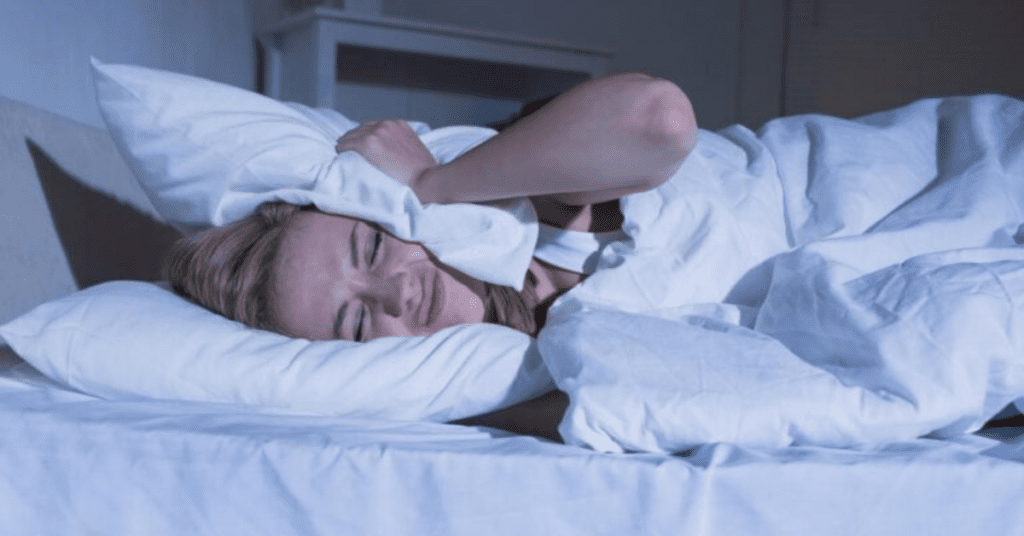One of the most significant issues that people with tinnitus face is poor sleep. Of course, we all know the positive benefits of a good night’s sleep. Good, restful sleep reduces stress and improves our mood, and it helps us think more clearly, boosts our immune system, and can even prevent weight gain!
If you’re reading this article, you’re probably one of the millions who are struggling with tinnitus, not only during the day but also at night while you’re trying to fall sleep. The disturbance of sleeping peacefully can result in bad moods, increased stress, depression, or other significant physical or psychological health issues.
At Treble Health, our audiologists are committed to helping those with tinnitus help reduce the sensation and relieve the associated symptoms. So, to learn more about achieving tinnitus relief at night and get back to sleeping more soundly, watch the video below, and keep reading!
Sleeping Positions For Tinnitus
Is there a proper sleeping position to best alleviate tinnitus? The simple answer is that there isn’t one best sleep position other than whatever you find most comfortable. However, when lying down to get to sleep, you do want to make sure that you do not accidentally block off your ears.
Not blocking off your ears is important because when covering up your ears with pillows or sheets, your tinnitus can become louder and more noticeable. This sensation is the same phenomenon that occurs when you use earplugs, put your fingers in your ears, or if you’re using earphones. When we have less access to sounds in our environment, we hear more of our internal noise, including our tinnitus.
"Treble Health helped me reduce my tinnitus by about 80%, and now I can live my life again!"


"Treble Health helped me reduce my tinnitus by about 80%, and now I can live my life again!"
– Steve D.
Book a free consultation to learn which Treble Health solution is right for you. Join Steve and thousands more who have found lasting tinnitus relief.
So, it is important to make sure that your ears are out and open. This strategy is a helpful tool to ensure that your tinnitus doesn’t sound very loud. It may sound simple, but it can be effective. You don’t want your tinnitus able to overtake the surrounding noise and be something you focus on.
You also want to ensure that if you have physical components to your tinnitus or somatic tinnitus, you’re not sleeping in a position that’s causing your tinnitus to be louder. So if there’s a position where your tinnitus tends to be lower, try to sleep in that position. If it helps, you can also use proper pillows (like sound pillows) and head elevations. Again, this helps to ensure that you’re not accidentally causing an increase in your tinnitus due to physical components.
Why Is My Tinnitus Louder At Night?
Tinnitus frequently seems louder at night because we are not as distracted and stimulated by things in our environment. At night when we try to fall asleep, it’s dark and quiet, so our brain will often start seeking stimulation. Unfortunately, this search inadvertently turns to our tinnitus for that stimulation.
During the day, we have many more stimuli to occupy our minds and bodies. We have information that we’re constantly bombarded with, sense of smell, taste, touch, hearing, and sight. In addition, we receive information from our friends, family, phones, and work.
Simply put, we have a lot more on our minds.
All of these stimulations help to distract us away from our tinnitus. But at night, we have a lot less going on, so it is common for us to notice our tinnitus.
For example, a research study conducted back in the ’60s put individuals with no hearing loss and no tinnitus in a booth. The study resulted in the majority of them, upon exiting that experiment, starting to have low-level degrees of tinnitus.
This study shows that when we are in an environment void of any other external stimulation, our brain starts to create it for us, which will often create tinnitus. So it’s normal when going to sleep at night to notice our tinnitus because it does tend to be louder.
The creation of stimulations is also something that happens with the visual system, called the Ganzfeld effect. So if, for example, you’re in a blinding snowstorm or very dark cave, and there’s no other visual information that the brain is receiving, it’ll start to create it for you after a few minutes. So as you can see, it’s normal and common.
What Practices Can I Do For Tinnitus Relief At Night?
The hearing doctors and audiologists at Treble Health want to make sure that we’re using practices, routines, and methods like sound therapy, retraining therapy, and even holistic strategies, to help reduce stress or anxiety levels related to tinnitus as we go to bed.
One of these methods is using a sound machine, a sound pillow, or a fan to create an environment rich with sound. Those with tinnitus can also consider using sound therapies such as nature sounds, music, podcasts, YouTube videos, or whatever you find to be soothing and relaxing.
The other practice for tinnitus relief at night is ensuring that your room is conducive to sleep. Most of us sleep better when it’s slightly cooler and if the room is dark with little light. To accomplish this, you should get some darkening shades and drapes and ensure the temperature is appropriately set. Whatever is the right temperature for you, whether it’s cooler or warmer, is what you should aim to get your room.
Finally, another practice to try and consider is to use some forms of holistic strategies to manage your stress and anxiety and help relax you for sleep. So, sleep-guided meditations, sleep-guided audios, listening to nighttime stories, audiobooks, or podcasts, can all be helpful. All of these aim to help you achieve muscle relaxation to help coax you into a nice sleep. Of course, simple meditation and visualization exercises can also be very beneficial!
Conclusion
Nighttime tinnitus relief is not a one size fits all method. There is no official cure for tinnitus, but there are effective techniques and approaches to try for tinnitus relief.
Everyone is different; therefore, everyone’s sleep routine is different. Luckily, there are so many different things that you can do to help ease your mind into sleep. Even something as simple as counting sheep or listening to an audiobook can be a helpful tool to get your mind off tinnitus and ready for a night of deep, rejuvenating sleep.
If you’re interested in Treble Health’s suggestions for sleeping with tinnitus, check out our blog that discusses 8 Ways To Sleep Peacefully With Tinnitus!
Next Step: Book Free Consultation
- 75% of patients reduced their tinnitus within three months after following our recommendations.
- "I feel like Treble Health literally gave me my life back." - Randy S. (verified customer)
- Join thousands of people who have reduced their tinnitus after scheduling a free consultation.


















